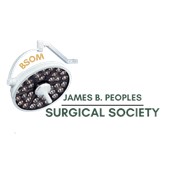
James B. Peoples, M.D., Surgical Society
About
The James B. Peoples, M.D., Surgical Society is an interest group for students in the Boonshoft School of Medicine who are interested in learning more about and pursuing a career in surgery. Dr. Peoples was professor of surgery, the Elizabeth Berry Gray Chair of Wright State University Boonshoft School of Medicine's Department of Surgery, and director of the region's general surgery residency program. Read more about Dr. Peoples here.
The Surgical Society has events throughout the semester and encourage those interested in learning more about surgery to attend. Past events include panel discussions of practicing general and specialty surgeons, gown and glove sessions, and suture labs. There are no dues or attendance requirements, any student may join our meetings/events when you are free. If you are a WSU Medical Student and would like to be an official member, click the join link to request membership.
Should you have questions or would like to learn more about the society, please contact us by clicking the contact button or e-mail us at bsomsurgsociety@wright.edu.
Giving Campaign: Please click here to donate to our BSOM Student Surgical Society Fund, which supports the activities of the James B People's Surgical Society.
Resource Links:
- Become a student member of the American College of Surgeons
- Medical student resources: American College of Surgeons
- Research Opportunities: General Surgery
- Residency: BSOM General Surgery